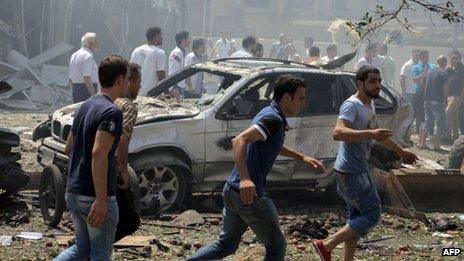How companies can survive in a crisis zone
- Published
Lebanese restaurateur Christine Sfeir talks about running a business in a politically unstable environment
Running a business can be unpredictable at the best of times. But sometimes freak events occur that could not possibly be forecast.
The political uncertainty and violence on the streets of Cairo that followed Islamist President Mohammed Morsi's removal from office in Egypt, for instance, forced businesses in the area to react rapidly.
US car giant General Motors, which employs more than 14,000 Egyptians, temporarily closed its Cairo office and stopped production in its plant there, while home appliance maker Electrolux temporarily pulled out its expatriate staff and halted production in the region for about a week.
Size matters
For large, global firms such as these the impact is temporary and usually minimal - slower or no production in Egypt made up for by higher production elsewhere in their global network.
But for smaller firms, the disruption can be harder to manage.
Christine Sfeir, chief executive of restaurant group Treats Holding, operates a restaurant chain called Semsom in Lebanon. The country was devastated by a 15-year civil war, which ended in 1990, while the effects of its 2006 war with Israel and the problems in neighbouring Syria mean it remains politically unstable.
Ms Sfeir says the turmoil has affected the way she runs her business.
When she recently opened a new branch of the restaurant in Lebanon's capital, Beirut, she planned a red-carpet launch with local celebrities, high-flying business people and media all in attendance.
But two days before the grand opening, trouble broke out an hour away from Beirut. Soldiers driving tanks continuously past the restaurant meant they had to shift the opening to a low-key, small scale dinner instead.
"I didn't feel it was right to do a big event while we have funerals going on," says Ms Sfeir, who was worried continuing with the original plan would have appeared insensitive and damaged the Semsom brand.
On a day-to-day basis these types of troubles hurt revenue, typically meaning no customers for three days. "We know when there is tension, the restaurant is going to be empty," Ms Sfeir says.
'Constantly in crisis mode'
Emile Khoury, chairman of the Virgin Megastore franchise in Lebanon, says this ongoing instability is particularly difficult for retail businesses such as his that rely on shoppers passing by and tourists visiting.
One of his 10 Lebanon stores is in Martyrs' Square in the centre of Beirut. After the war with Israel, protesters set up camp in the square for six months, meaning any shoppers had to pass through this to enter the store. Unsurprisingly barely anyone did.
Mr Khoury estimates he has had to close down the shop for at least 100 days over the past eight years.
"It's very difficult. We're constantly in crisis mode. Our revenues go down tremendously so we have to adapt. We delay payments to suppliers, reduce operating expenses and negotiate rents down with our landlords.
"Right now we don't see an end to the open war in Syria. We've reduced to a skeleton staff, reduced working hours and reduced inventory."
Don't panic
Is there anything small firms can do to protect themselves against this kind of disruption?
Patrick Lord, managing director for global risk consultancy Control Risks in the Middle East, says planning is key.
"There are three key points - understand the context of your business on a national, regional and local level, do scenario planning and work out the likelihood of them happening and remain updated as things can change extremely quickly.
"Unless you have that planning formula right from the start, then you are leaving yourself open to last-minute panic," he says.

Lebanon remains unstable, as August's explosion in Tripoli shows
US eyed
For Ms Sfeir, the impact of such continual short-term disruption has made her look beyond the borders of her own country to secure stable revenues. Semsom now has restaurants in Kuwait, Saudi Arabia and Qatar. Next she has set her sights on North America.
"I don't think Lebanon will be stable in my lifetime. To be able to sustain from a business perspective, you need some stability, you need to be able to make long-term plans. [At present] we only make plans for next month, cannot make plans for next year or for five years.
"Opening in other countries in the region and hopefully outside the region as well gives us this stability and this gives us a way to keep growing and to know that in 10 years we can still be here," she says.
Similarly, Mr Khoury has stores in Saudi Arabia that provide stable revenues and where he admits business is much easier because "most of the parameters are within our control".
But when asked why he doesn't shut down the Lebanon stores and instead focus his business elsewhere, he is aghast.
"We are Lebanese and we want to support our country. We have to believe better days will come. But we cannot predict when and if they will."
Escape from the Boardroom is a five-part series, starting on 21 September, broadcast on BBC World News on Saturdays at 02:10 and 15:10, and Sundays at 09:10 and 21:10 (all times GMT).
- Published20 September 2013